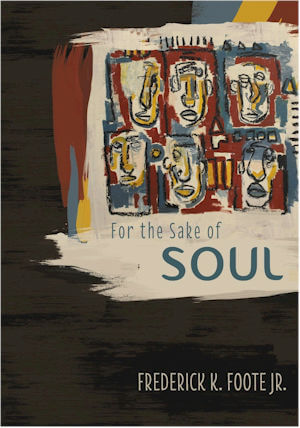Book Review: For the Sake of Soul
Reviewed by:
Robert FlemingSometimes short fiction can be a daunting task for the writer, especially when he decides to confront the challenges of plot, characterization, dialogue, and candor. Frederick K. Foote, a professor at California Community colleges and a traditional Black college in South Carolina, realizes this fact as he mines the details of his life for the printed page in his skillful short story collection, For The Sake Of Soul. He knows his material well. He has lived it, so he understands if the reader can embrace his impressive imagination, then the tales of his ordinary men and women will grip his soul.
Comparisons to his work will be made to such stellar authors as Ernest Gaines, William Faulkner, Robert Penn Warren, Erskine Caldwell, and Robert Stone because of Foote’s effective use of time and place. He drops his people into the locales of the American South, central California, Vietnam in one of the significant time periods of the 1960s and 1970s. His vision is deceptively simple and authentic, and the overall effect is powerful.
Foote divides his collection into a trio of themes: “Family,” “War Here And There,” and “Gainful Employment.” In his opening story, “Guest in Black and White,” a sixty-six year old man recalls the dramatic encounter between his grandfather and a convict on a small farm near Richmond, Virginia in 1949. The story is told in modest terms without any embellishment. Another tale, “Russell Recalls,” moves through the troubled mind of a rural youth after the death of the patriarch of his family and its tragic aftermath. Here, some of the essential detail is missing but the reader walks away realizing life can sometimes go awry. Conflict is an essential component in his cautionary fable, “Running Down,” another boy tries to shield his beloved pal from the traps of the projects and the temptations within them. Still, the inner city puts its stamp on both of them as they try to rise above the scourge of “more nigger shit in the projects.” One of his rawer stories, “Dead End” possesses an “in your-face feel” to it with a jittery man and a junkie girl in a sordid motel room, recalling the bold work of lit rebels Donald Goines and Hubert Selby.
It is to Foote’s credit that he does not avoid the critical social and political issues that have defined us in our ongoing campaign for human rights. When the author has his character, Houston, speak on the pitfalls of integration in the lead-off story, “The Platform” in the war section, he sounds like Langston Hughes’ noble bard, Simple, pontificating on the world’s ills. “Nigger, please, integration’s a bad joke on poor colored folks,” Houston says. “It’s a mean, low down trick you talented tenth, college clowns pulling on your own people, people that don’t know any better.” A lot of blacks, especially the elders, certainly feel this way.
As a veteran of the military, serving a three-year stint in the Air Force, Foote’s work in the war section is hard-edged, precise, and somber. It’s probably his finest work in the collection. Among his best offerings in this area, these yarns of the stars and stripes stand out, including “A Tale of Two Sergeants,” “Firefight,” “Court Martial of Samuel James Wilson,” and “The Home Front.” You can tell Foote was an astute observer of military life from these stories.
Work plays an important part in Foote’s short fiction as well. His concluding segment, “Gainful Employment,” contains all of the ironies and shortcomings of surviving corporate life in two vital stories, “The Appointment” and “The Hearing.” Not everyone escapes the demanding, hectic world of punching a clock for a paycheck unscathed. In the first story, the main character, a Civil Rights coordinator mandated to prevent bias in hiring, suffers in his post from the same prejudice he’s ordered to fight. And in the last tale, a man who has represented employees at administrative hearings is thrown in a tangled legal depute without court room experience. Both black men struggle to keep their heads above water.
How many of us have felt this feeling of impotence and powerlessness? As Foote goes deep into the baffled mind of his protagonist in “The Appointment,” he reveals the hopelessness of getting caught between a rock and a hard place. “A silver pen there for my signature on the spot, on the dotted line, and I can return to my hole until next Ground hog’s Day. They, both of them, are holding their breaths waiting for the nigger to jump through the hoop. Jump, nigger, jump. I admire the finely wrought silver pen.”
With this collection, Foote writes of complex matters involving family, culture, and race. His solid talent for short fiction will improve with each sentence, each story, as he continues to craft tales without endless weeping or pity. If there is a shortcoming about the stories, there is often confusion in the narrative, not enough connective tissue or detail, and over reliance on dialogue. The reader need to be shown rather than told. Still, the whole collection is a knockout.


